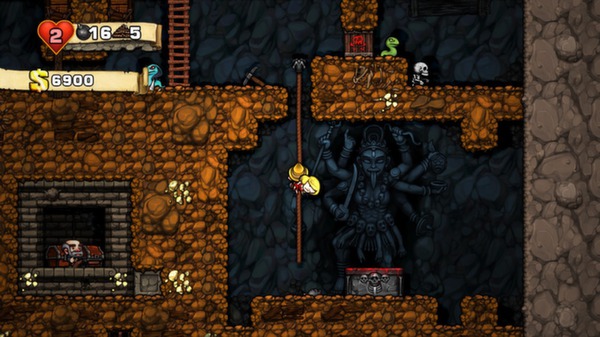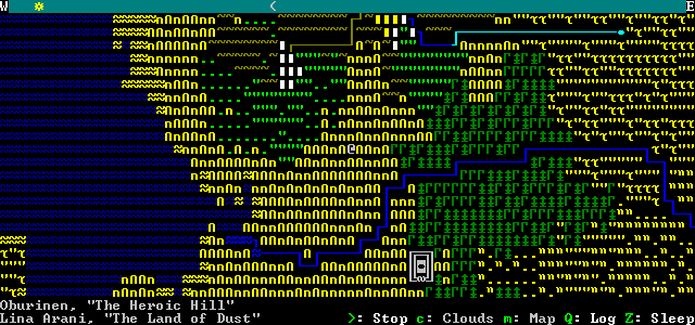I'm Bad At Videogames. That's Why I Love Roguelikes
I am bad at videogames.
This is not something I am ashamed of. In fact, I pretty much believe that, if you want to be a games writer or a games journalist, being bad at videogames is a necessary requirement. If you’re good at videogames, you just play them. Only if you’re bad at them, if you get stuck or you die over and over, that’s when you need to start thinking about them. That’s when it starts.
Being bad at videogames is not a bad thing. In fact, I think it’s its own kind of edge. Sometimes a city will go through massive reforms after hosting an international event, because it shows the problems it had with transport or housing or healthcare. The problems have always been there; the even just brought them to surface, like a bicycle tire immersed in water. (Er, I seem to have just used a metaphor inside a metaphor.) Being bad at games goes the same way. A good player is more capable of overlooking flaws, not because they are more forgiving, but simply because they weight on them less.
So I come here, as a bad player, to speak to bad players all around the world: Have you played roguelikes? They’re pretty cool. I think you’d like them.

This may look to some to be strange advice. After all, one of the things roguelikes are best known for is their maddeningly high difficulty. Most games can be finished through sheer grit and patience; keep trying, keep banging your head against that wall, and eventually it gives out. You only need to get lucky once, and you’ll advance.
But roguelikes do not offer this meager mercy. If a section is too difficult for you, it merely marks the end of your game. First because you cannot save in roguelikes: every journey starts from the beginning, so every defeat is final and true. And second, since levels are randomly generated, you cannot attempt a section until you succeed, because you’ll more than likely only be able to attempt a section once. Should you fail, the next time you’ll find something completely different.
I can kind of see where this perspective comes from. Roguelikes are, in fact, by and large, very difficult games. Completing a game like NetHack – probably the roguelikiest of roguelikes, since it’s the one most directly based on Rogue – is an awe-inspiring deed. The list of requirements for an ‘ascension’ boggle the mind, and also betray how unforgiving the game is. It is necessary, for instance, to have resistance to all elements, because powerful enemies in the late game have elemental attacks that will kill your character in one hit. Roguelikes are so hard that, during the wild roguelike boom of the mid-tens, when people were calling everything a roguelike, someone went and said Dark Souls was a roguelike, even though it has nothing in common with roguelikes, except for the part that it is extremely difficult and requires nigh flawless play to complete.
(Well… I suppose you could argue that the bonfire system is a sort of permadeath, since it has irreversible consequences in the game… but that’s a bit like saying Monkey Island is a shooter because you spend most of the game moving your mouse towards things and shooting them.)

But therein lies the magic. Yes, roguelikes are very difficult. But that’s the secret. You don’t have to finish them.
Let’s make a comparison. Ata round the same time roguelikes were coming into vogue(likes), I was playing Blood, the 1997 shooter from Monolith. As you can imagine, that game was entirely too difficult for a soft boi like myself who starts essays by announcing he’s bad at videogames. I could advance at the game, yes, but only at the cost of abusing the autosave feature. Walk into a cathedral, start killing enemies… die. Try again, do better this time… die again to hidden enemies I hadn’t seen. Try again, focus on the hidden enemies… die to concentrated fire from the regular enemies. Try again, this time doing everything right… focus on the hidden enemies, but use the level geometry to protect myself from the others… Yes! I’ve done it! But I can’t save, because my health is too low. What if something more dangerous is around the corner? Take another step, die to a well-positioned weak mook. Try again.
Meanwhile, if that game was a roguelike, I’d only have died the first time. Then I’d have moved on.
This is what I find strange when people say they’re too bad at videogames to enjoy roguelikes. Do they like being stuck? It’s entirely unlikely that their library consists entirely, solely of easy games, so eventually they must come up to something they can’t get past. And when they do, they’re stuck. They need to keep trying to get past. They need to have patience. They need to keep trying, to bang their head against the wall, until the game finally gives out. If you admit you are bad at videogames, do you find this fun?
Roguelikes offer, for me, a simple promise: no matter what’s on the other side of an encounter, after I’m through with it, it’s gone forever. Maybe I’ll be able to get past it and move on to a new challenge; maybe I’ll die and have to restart from the beginning. But, on a roguelike, these are equivalent: I’ll find myself on a new situation I’ve never been before.
At this point, there are some points that one may rise to counter my argument. The first one, most likely, is about accessibility. Shouldn’t all games be accessible to everyone? And I agree, yes, they should; but I feel that this point is settled after Celeste, a game that is maddeningly difficult, but also had an array of accessibility options so wide that nearly anyone can play it to a way that challenges them fairly. This proves two points. First, that universal accessibility is possible, at least in theory (in practice, issues of cost and work-hours get in the way). Second, that accessibility isn’t merely a matter of pushing an accessibility button: it’s a difficult job, and it may take as much work to get right as it takes to get the game made in the first place. (Plus, accessibility does not mean ease; NetHack, which we've already established to be extremely difficult, is also one of the oldest games that’s completely playable on a screen-reader.)
The second counter-argument is one that I feel carries a similar weight but comes from a more sincere place: am I fetishizing loss? Am I happy that I’m being crappy at the game, and thinking that this makes me a better human somehow? This is a fair argument: it may be that I internalized my supposed lack of ability to the point that it's an integral part of my enjoyment of games. One might even argue this is a common mindset in roguelike games, too: a common saying amonsgs Dwarf Fortress enthusiasts is that Losing is Fun, and they show it by replacing one word with the other (as in, "Opening hellgates inside your fortress may cause Fun!")
Let's use that as an attack vector. I'd like to start by saying that, once, playing Dwarf Fortress, I accidentally set my farms to exclusively grow a crop I had a single-digit numbers of seeds for. As farms were my main source of food, I inadvertently caused a famine, one that I only realized was underway when my dorfs started starving to death and there was no way to quickly revert the population. Nearly two-thirds of my fort died. (Hey, I did say I'm bad at videogames.)

Two-thirds is less than all, though. I didn't die. I didn't lose. For the fandom, that wasn't the Fun one might expect. Dwarf fortress is complex, unforgiving and unyielding, but even a dumb mistake like that wasn't enough to "kill" me all the way. This is why Losing is Fun is an important precept in the fandom: it allows you to switch from mantaining a big, complex fortress full of demanding nobles and specific requirements back to a small fortress with more immediate danger but a smaller, more manageable scope. Since Dwarf Fortress' consistent history generation means you can't have two fortresses in the same world, Fun is a way to change gears and try again, as well as to place a capstone on a fort's history.
This encapsulates a lot of my feelings towards dying in roguelikes. A true death in a videogame, to me, is not a screen that says 'you have died', but a situation you can't move on from. Lots of adventure games have no way of dying, but if you cannot solve a puzzle and move on, you are as stuck as if you were repeatedly dying on the same spot of an action game. And roguelike games never have that. This is the true power of the genre, the solution to the zen riddle they present: by dying repeatedly, you become immortal.
February's Link Roundup
I have great interest in literature, but it's rare that a story about literature is as interesting as the stories it generates. This is one rare such case; a mysterious person has been approaching people all around the literary world, in many languages, and trying to make off with manuscripts. Not rare, unreleased manuscripts - not often, at any case; an upcoming novel from a famous writer is as likely a target as a beginner author's debut novel. This two-year mystery came to a head when Filippo Bernardini, a 29-year-old Italian who worked with rights aquisition, was arrested for the crimes - albeit this does not answer the more pressing question, why he was doing it in the first place.
How Google's AI Viewed the Move No Human Could Understand
My interest in videogames is not only because pew pew pew ha ha you lost, but also because of an admiration for what games are and what they can be. In this context, this article comes at a peculiarly parallel approach to my interests. During a recent match of Google's AlphaGo AI against a Go grandmaster, it made a move so bizarre that none of the experts watching could make sense of it. This is what AIs truly are - their thoughts are alien to us.
The article neglects to explain what the move was, which undermines it a bit, but fortunately, I don't play go, so I wouldn't get it anyway.
Do we, guys? Do shadows even exist? What the hell are them :(
I have no video suggestion for this month - instead, I'll be a bit gauche and suggest a videogame. The Zium Society creates some of my favourite games, virtual art galleries that present a variety unthinkable for any physical installation, and they released a new installment this week. If you don't know them, I strongly suggest you play them all. The second one, Zium Garden, in my personal favourite.